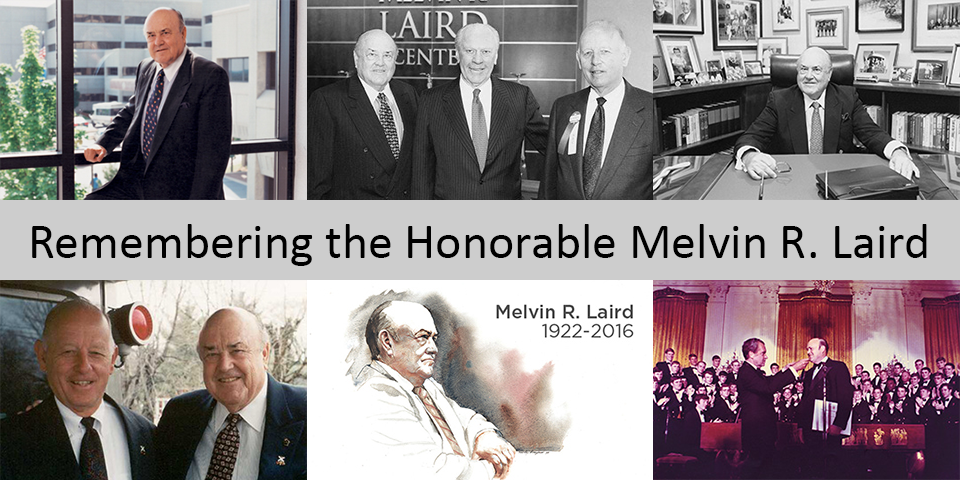This article originally appeared in Pulse.
The Honorable Melvin R. Laird, former United States Secretary of Defense, health care champion and long-time Marshfield Clinic supporter, died Wednesday. He was 94.
Laird was born Sept. 1, 1922, and grew up in Marshfield. He served in the U.S. Navy during World War II in the Pacific Fleet with Task Force 38 and 58, from 1942-46. He was wounded during a Japanese kamikaze attack in January 1945 while serving aboard the U.S.S. Maddox and was awarded the Purple Heart for his service. He was later awarded the Presidential Medal of Freedom in 1974 and The Harry S. Truman Award for distinguished service in defense in 1985.
In 1945, he married Barbara Masters, who later died. In 1993, he married Carole Fleischman.
He has four children - John O. Laird, Alison Laird-Large, David Laird and Kimberly Dalgleish; and five grandchildren, Rady Large, John David Large, Connor Laird, Harrison Laird and Carly Dalgleish.
Funeral arrangements have not been announced.
An impressive career in U.S. government
While he served in the Navy, Laird’s father died near the war’s conclusion. Laird returned home to fill his father’s state senate seat. At age 24, he was the youngest senator ever to be elected in Wisconsin. While a state senator, Laird chaired the Military and Veterans Affairs Committee, Joint Finance Committee and Legislative Council; and was a member of the Wisconsin Educational Commission.
In 1952, he was elected to the 7th District of the U.S. Congress for the first of nine consecutive terms. During his congressional career, Laird was a ranking member of a number of committees. Between 1956-67, Laird was appointed as an expert on the treatment of mental illness to the U.S. Delegation to the World Health Organization (WHO) in Geneva, Switzerland, by three presidents - Dwight Eisenhower, John Kennedy and Lyndon Johnson. He also was the ranking minority member of the subcommittee on Health, Education, Welfare and Labor Appropriations and subcommittee on Defense Appropriations.
One testimonial to his capability was voiced by President Eisenhower when he named Laird one of the 10 men in America best qualified to serve as president of the United States.
Secretary of Defense under President Nixon
Laird served as Secretary of Defense in the first administration of President Richard Nixon. He was voted, in the department, in a poll of reporters covering defense and national security issues, “the most effective, likeable, trustworthy, strong and forthcoming Secretary of Defense.”
While Secretary of Defense, Laird withdrew 20,000 U.S. ground combat forces from Korea and ordered a race relations task force be created to develop a program for racial harmony in the military. He became the architect of the Vietnamization plan, whereby the American role in Vietnam was to be gradually replaced by the South Vietnamese military. When Laird resigned, he had established the all-volunteer military force, presided over the end of the draft and reduced the military budget.
In 1973, after completing his term as Secretary of Defense, he was asked to become President Nixon’s top Counselor for Domestic Affairs. President Nixon felt Laird’s talents were needed to provide an effective liaison between the White House and Capitol Hill during a critical period.
An advocate for health care and research in Marshfield and across the country
Besides his career in politics, Laird also had a legacy in promoting health care, especially research. He co-authored legislation to finance construction of the National Library of Medicine and important centers for medical research on many university campuses, and the major institutes of the National Institutes of Health. With Congressman John Fogarty (D-Rhode Island) and Senator Lister Hill (D-Alabama), he also provided for the building of the Centers for Disease Control and Prevention in Atlanta.
He instituted MEDIHC, Military Experience Directed in Health Careers, a program to help medically-trained servicemen find meaningful civilian careers in health professions.
Not only was he involved in national health care, but he played a key role in furthering the mission of Marshfield Clinic, including helping secure medical research grants. He was a member of Marshfield Clinic’s National Advisory Council from its inception in 1982 and became an emeritus member in 1998.
The Melvin R. Laird Center was officially dedicated Sept. 12, 1997. Hundreds of Laird’s friends and friends of the Clinic turned out, including President Gerald Ford, to help dedicate the building named in his honor, while still over a thousand more toured the facility. The theme of building a safer, healthier future in which medical discoveries move quickly from research to applied patient care permeated the Sept. 8, 2006, groundbreaking ceremony for a significant addition to the Laird Center for Medical Research.
Laird knew the Clinic’s founding fathers and expressed his appreciation in recent months of the Clinic celebrating its milestone 100th anniversary. During the 2008 dedication ceremony for the Laird Center expansion, he spoke about the importance of the work Marshfield Clinic does and what it meant to him:
“All the research in the world is not worth very much if you don’t get it to patients. This is an example of the best way of getting research to patients. I’m very proud of what the Clinic has done and what they’re promoting all over the United States.”
Today, health system leaders, staff and community members are grateful for Laird’s dedication to health care, medical research and support of Marshfield Clinic and the community.
“Mr. Laird left an indelible mark on the Clinic and we are so very grateful,” said Susan Turney, M.D., Marshfield Clinic Health System CEO. “As we continue to celebrate our 100th anniversary and reflect on Mr. Laird’s impact on the Clinic, we need to keep the spirit instilled by our founders and health care champions like Mr. Laird alive by continuing to enrich lives and healthy communities through compassionate health care.”
Below is a video interview of Melvin R. Laird talking about why health care and Marshfield Clinic is important to him:

